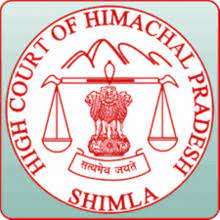Education – Quota for bona fide Himachali students irrespective of their place of schooling – MBBS/BDS Admission – Eligibility/Qualification Criteria – Quota for all the bona fide Himachali students or children of bona fide Himachalis, irrespective of their place of schooling – Challenge to – Prayer to continue the eligibility criteria for children of bona fide Himachalis who have passed at least two examinations out of major examinations from recognized schools/colleges situated in the State of Himachal Pradesh – Reasonable Classification – Policy decision – No arbitrary or irrational order – Not against any Statute or Constitution. (Para 48, 82, 102 to110)
No doubt, on account of inclusion of aforesaid category, competition amongst bona fide Himachali students would increase, but that cannot be a ground for this court to conclude that policy decision, whereby aforesaid change came to be effected is malafide, arbitrary and irrational, rather same appears not only to be reasonable and logical but can be said to have been effected to do justice to one category of students, who were denied benefit of availing State quota seats on account of theirs having not passed at least two examinations from schools situated in State of Himachal Pradesh, which in fact was not in their control on account of the fact that they were compelled to live outside the State of Himachal Pradesh because of employment of their parents. (Para 48)
There is nothing on record to conclude that the decision to effect change in the prospectus with regard to eligibility and qualification criteria, is malafide, unreasonable, arbitrary or irrational and as such, court, while exercising power of judicial review, cannot interfere with the same, especially when no material has been placed on record by learned counsel for the petitioners to demonstrate that the change in policy decision is against the statutes or Constitution. (Para 54)
By now it is well settled that Article 14 of the Constitution forbids class legislation but does not forbid reasonable classification. (Para 82)
In view of paucity of the employment in Himachal Pradesh, bona fide Himachali are compelled to take up jobs outside the State of Himachal Pradesh. It can also not be disputed that majority jobs are in IT sector, scope of which is negligible in the State and as such, it cannot be expected that bona fide Himachalis, who are residing outside the State of Himachal Pradesh have taken up job outside the State, of their own rather, due to paucity of Government/private jobs in the State. (Para 102)
The prospectus clearly reveals that a candidate seeking admission to Government/private medical colleges in the State, under State Quota is required to furnish an undertaking/affidavit (as provided in Appendix 15 of the prospectus), undertaking therein that he/she has not availed the State Quota in any other State and in case, such declaration is found to be incorrect/false, his/her candidature is liable to be rejected. (Para 108)
While balancing equities, it is the larger public interest, which is to be taken care of by the courts, as such, as weighed against the inconvenience and injustice, which shall be meted to the students, who have availed the benefit of change brought about by the respondent-State, the petitioners’ right is on a lower pedestal (Para 109)
HIGH COURT OF HIMACHAL PRADESH
2023 STPL(Web) 154 HP
[2023:HHC:10342]
Aryamann Sharma And Other Vs. State Of Himachal Pradesh And Others
CWP Nos. 4834 of 2023 with CWP Nos. 5007, 5520, 5660, 5661, 5758, 4887 and 4888 of 2023-Decided on 6-9-2023
https://stpllaw.in/wp-content/uploads/2023/09/2023-STPLWeb-154-HP.pdf







